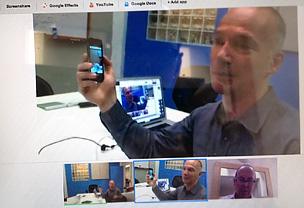Huddle and Sidecar - going global, looking West
- Published
- comments

Information can be shared in the cloud
I've been speaking to two smart young technology companies based 5000 miles apart. Both are seeking to transform the way we communicate and both have learned the same lessons. Go global as quickly as possible - and head West if you want funding.
First Huddle, a London-based technology firm offering businesses collaborative workspaces in the cloud. Err what? Let me explain. Huddle - which I first wrote about in 2009 - is software that is now used by hundreds of organisations big and small to share information, pool content and even hold virtual meetings from any computer.
Last night the company announced major new funding - $24m in an investment round led by Jafco Ventures, a Palo Alto venture capital firm. Note that the figure is in dollars because the firm's centre of gravity appears to be moving West - its announcement was datelined San Francisco and London.
When I spoke to co-founder and CEO Alastair Mitchell, he told me this put Huddle firmly on the path to an IPO. The business is relatively young, although revenues are tripling each year, and a workforce of 200 still puts it in the SME category. But right from the start it seemed to have global ambitions and a determination to get acquainted with Silicon Valley financiers.
Huddle's customers include the UK government but also global brands like Diageo and P&G. Very early in its development it opened a San Francisco office and now has a base in New York too. "We go where our customers are," says Alastair Mitchell.
But he also believed there was a marked difference between attitudes to funding in London and San Francisco. His firm did not constantly need new cash just to keep going, as was the case with many Silicon Valley startups - "We've hit profitability a couple of times - that's a big contrast with US firms which are raising to cash to survive."
The other firm I've been speaking to is based in San Francisco and is much earlier in its life-cycle than Huddle. Sidecar is a new smartphone app which aims to reinvent voice calls - by allowing you to share photos or video or other content in the middle of a call. In some ways then it's trying to do the same for consumers as Huddle is doing for businesses - enable better communication without the need to travel.

Rob Williams spoke to me via a Google Hangout
As if to demonstrate their determination to go global right from the start, the firm has employed an energetic PR consultant in London. She arranged for me to "meet" Sidecar and a few days ago, one of the founders Rob Williams got into his car at midnight in San Francisco and drove to his office to talk to me via a Google Hangout. Sitting at my breakfast table in London, I watched two separate webcams in San Francisco, one showing me Rob, the other a live demo of the app in action.
I reflected on what this said about a new era of seamless communication where cheap or even free tools would allow us to work from anywhere. And then I asked a question - what was the business model behind Sidecar?
Here, Rob was vague, talking of concentrating on building the user-experience before worrying too much about revenue, which might eventually come from calls to non-Sidecar users, in the same way that Skype makes money. But with plenty of venture capital funding plus the deep pockets of co-founder Rob Glaser, who made his money from Real Networks, Sidecar can afford to be quite relaxed.
Silicon Valley, and its venture capital industry, is still taking big and risky long-term bets on lots of ideas that might never pay off. I'm not sure that is yet the case in London, which is why ambitious UK technology entrepreneurs still head West for inspiration and funding.